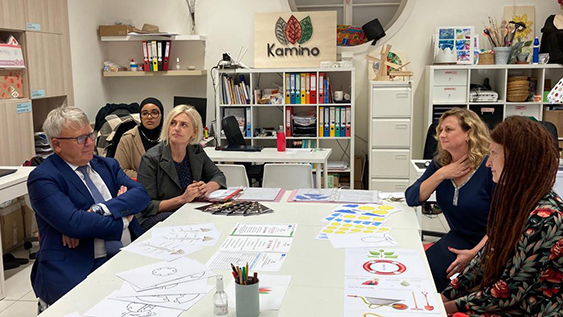
On a visit to Prague today, Nicolas Schmit, European Commissioner for Jobs and Social Rights marked the work the Czech presidency has undertaken to advance social rights across the country.
Speaking at a high-level conference on the European Child Guarantee, the Commissioner also met representatives of the Kamino Centrum (kamino means “path”), a project in the capital’s city centre that provides a safe and creative space for homeless people. Kamino focuses on support for women, though men can also take advantage of the project’s many services.
Commissioner Schmit said, ‘This very interesting and inspiring project can also serve as an example for the work of our European Platform on Combatting Homelessness’.
Supported by ESF funding, Kamino has enabled participants to rebuild their lives, reducing their social exclusion and increasing their employability. The Kamino Centrum draws on the experience and good practices developed over four years as part of the community centre, creating bespoke support arrangements through person-centred planning.
The project focuses on finding the strengths, talents and skills of participants. Individuals are able to engage in social activities – such as cooking and sharing dinner, theatre and art workshops, as well as activities that aim to aid in self-discovery, development and reflection. Nearly 100 homeless women and men are now involved in these supportive and creative activities. The project also publishes ‘Žitná’, a seasonal magazine where participants can develop social networks and express themselves in an open forum.
Unlike traditional social services, Kamino Centrum also focuses on general awareness raising and connecting marginalised people with society. It organises public events, informs about the issue of social exclusion, and fights against social stereotypes. It also seeks to actively connect with other organisations working with homeless people and tries to involve the wider public in its activities. The project seeks to actively develop innovative ways of working with participants, highlighting examples of good practice.
The platform, delivered under the European Pillar of Social Rights Action Plan, involves representatives of the EU institutions, civil society organisations, social partners and cities that signed a declaration and pledged to work together to trigger dialogue, facilitate mutual learning, improve evidence and monitoring, and strengthen cooperation among all actors that aim to combat homelessness.



